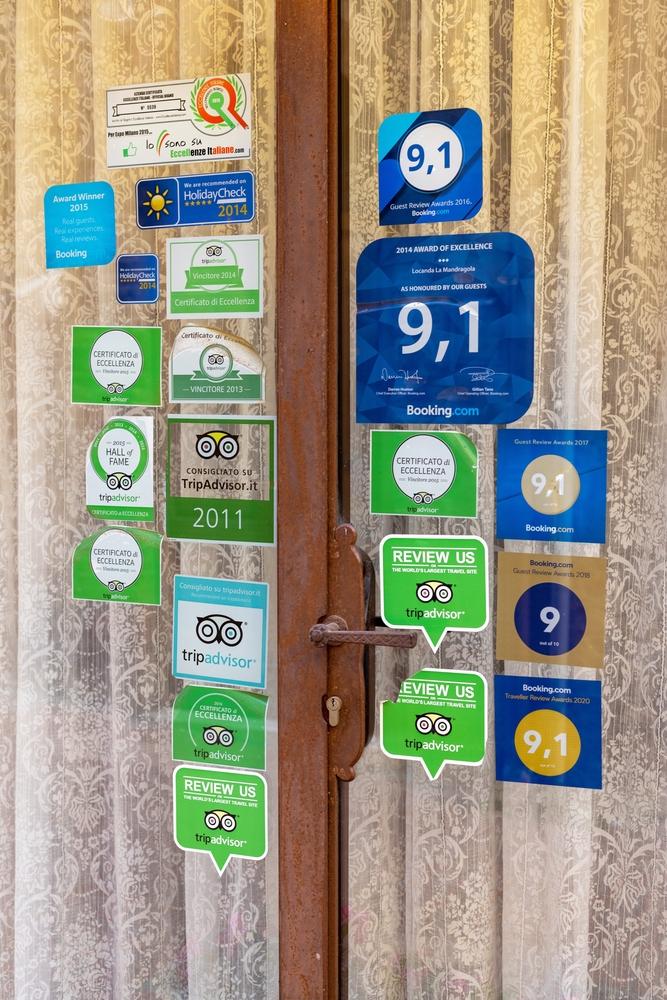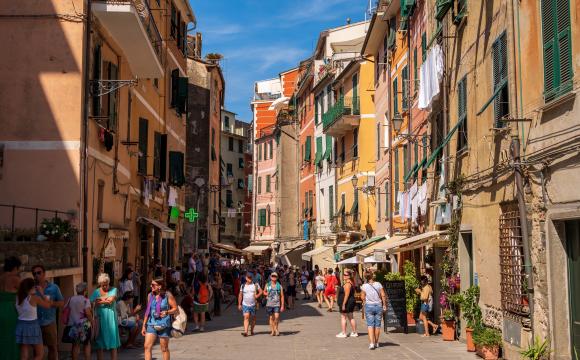The Italian tourism ministry has gone to war. Their formidable adversary? Online review(er)s.
The first battle will take place in parliament. Tourism Minister Daniela Santanché has introduced a draft bill that aims to combat fake or misleading reviews on travel review websites like Tripadvisor. Social media platforms — where much of “review culture” resides via influencer profiles and user comments — would remain unaffected for now.
Santanché and the tourism ministry say they are standing up for the little guys — small hotels, restaurants and other businesses that sometimes have to spend ages bouncing back from one bad review.
If passed, the law would require online reviewers to be verified with ID to certify that they actually visited the establishment or used the service in question, and would prohibit them from writing a review after a 15-day window.
“We will put an end to this illegal practice. There will be more transparency and, most importantly, there will be no unfair competition,” said Santanché, who is also set to stand trial in March for alleged falsification of financial statements.
Ensuring the truthfulness of reviews, said Santanchè, is essential to the success of businesses, which rely on reviews to bolster the trust of consumers. The measure therefore “protects jobs and the commitment of business owners who believe tourism is an indispensable engine of development for our nation.”
But what does this mean for small businesses in the tourism industry and the online ecosystem of reviewing that supports them?
What’s in a law?
The Tourism Ministry says they want to introduce this law to erase fake reviews and expose hidden advertising — such as reviews that are bought and sold, or otherwise incentivized — and thus get rid of unfair competition.
The proposed law also addresses how reviews are written and the right to reply and demand the removal of bad ones. The law would allow tourism entities to request deletion — even of verified reviews — after two years if they can prove that the problem has been resolved.
The law is expected to pass through both houses of parliament unopposed, CNN Travel reported.
Confescercenti Nazionale, an association that represents small- and medium-sized tourism entities, said in two separate statements that efforts to combat false reviews were a “significant step” but that the proposed law didn’t do enough to protect small- and medium-sized enterprises more generally.
“We expected a lot and we find very little,” the association’s first statement after the draft bill’s introduction read. “It is certainly insufficient in giving Italian micro-, small- and medium-sized enterprises their due [...] We also find no mention of efforts, even potential ones, to stop the commercial desertification that is increasingly sweeping the country, or to protect local businesses from the outsized competition generated by international giants.”
The word on the street
Tourism accounted for more than 10% of Italy’s GDP in 2023, and is expected to grow over the next 10 years. The industry is the engine of many communities across the country, which are often made up of small businesses of locals managing generational trattorias and family-run B&Bs.
But a perfect storm of overtourism and the rise of “review culture” has made many spots famous worldwide, delivering opportunities for growth beyond the local communities where they are rooted.
The epitome of this phenomenon is All’Antico Vinaio in Florence. The sandwich shop famously scaled up to a global franchise with over 30 stores after harnessing the power of Tripadvisor early on. At the time of writing, it has 31,628 reviews on the site, thousands above its closest competitors.
Monitoring online reviews, for many venues, is now its own branch of customer service — with teams often responding to or working to eliminate the bad ones.
Fabio Rocchetti, Operations Manager at a capsule hostel in Milan, told Italy Magazine that their customer service team examines every review and responds in suit, reporting any inappropriate or unfair (in their opinion) reviews to the platform — whether it’s Booking, Tripadvisor, Google or similar.
“I believe the possibility of reviewing a place only after staying there must be fundamental,” Rocchetti said. “Because currently anyone who has made a reservation or paid for one can make a review even if they haven’t used the service.”
It’s not necessarily the content or claims of these reviewers that have the most impact, either. Consumers can always resolve to take scathing reviews (or glowing ones) with a grain of salt. But a venue’s star count (or in Tripadvisor’s case, “bubble rating”) affects how businesses are ranked and filtered in search results — meaning consumers might never find a venue that’s been dragged down by one or two low ratings, or might disproportionately favor one that’s quietly incentivizing positive reviews with discounts or other perks.
Both Booking and Tripadvisor have guidelines that must be followed when writing a review, and they allow an accommodation or other place to eliminate reviews they deem unfair or inappropriate — after the fact.
The proposed law, on the other hand, would require proof of identity and authenticity before typing out a review online.
“I think it’s very necessary,” Jeffrey Di Costanzo, an Australian who owns Casa Via Costa, a boutique B&B on the island of Ischia, told Italy Magazine. “Otherwise, the reviews lose their value, if there are fake reviews everywhere.”
He underlined how important reviews are today for small accommodations like his, which is still in its first year of business.
“The biggest blocker for me was that there were no reviews,” Di Costanzo said of starting a B&B from scratch. “Without reviews, people are untrustful.”
Since it opened, Di Costanzo’s place in Ischia is doing well and has started receiving reviews on Booking and Airbnb, where he advertises. He remains wary of other sites, like Google, which he has only recently activated, because it currently allows anyone to leave reviews.
Are influencers next?
The new law would also make it illegal to buy or sell reviews, including between entrepreneurs and intermediaries, attributing reviews to products not actually addressed in the review, or offering incentives, like discounts on services, for positive reviews.
Agcom, Italy’s regulatory body for communications-based industries, would be tasked with defining codes of conduct for operators of online platforms and other sites with reviews, to ensure the identity of reviewers, the authenticity of reviews, transparency and impartiality.
Violating the new rules could mean being hit with fines, overseen by the Competition and Market Authority (Agcm).
Representatives of Assouenti, a nonprofit association for the rights of consumers, have suggested that not addressing social media is a significant gap in the law: “A myriad of influencers and micro-influencers review restaurants, venues, spas and accommodations every day through content that appears to be personal and impartial opinions, but which in reality is the result of commercial agreements or concessions of gifts that are not always clearly communicated to the public.”
It’s also unclear how editorial reviews on traditional media publications and websites, many of which publish reviews of comped experiences, will be affected by this law. There’s still much to be determined while the draft makes it way through parliament.
Editor’s note: Members of the Italy Magazine editorial team accept complimentary hotel visits in order to facilitate consistent production of our Inspired Stays column, which is disclosed at the top of every article in the series. Our contributors are prohibited from accepting payment or gifts in exchange for specific types of coverage. Businesses and their publicity teams do not review or shape these articles before they are published, and no changes are made after publication, except in the rare case of necessary corrections to factual errors.
Sponsored content on our platform, which businesses do review before publication, is always denoted by gray “Paid content” tags at the top of the article below the headline. Any paid content on social media is tagged #ADV.













